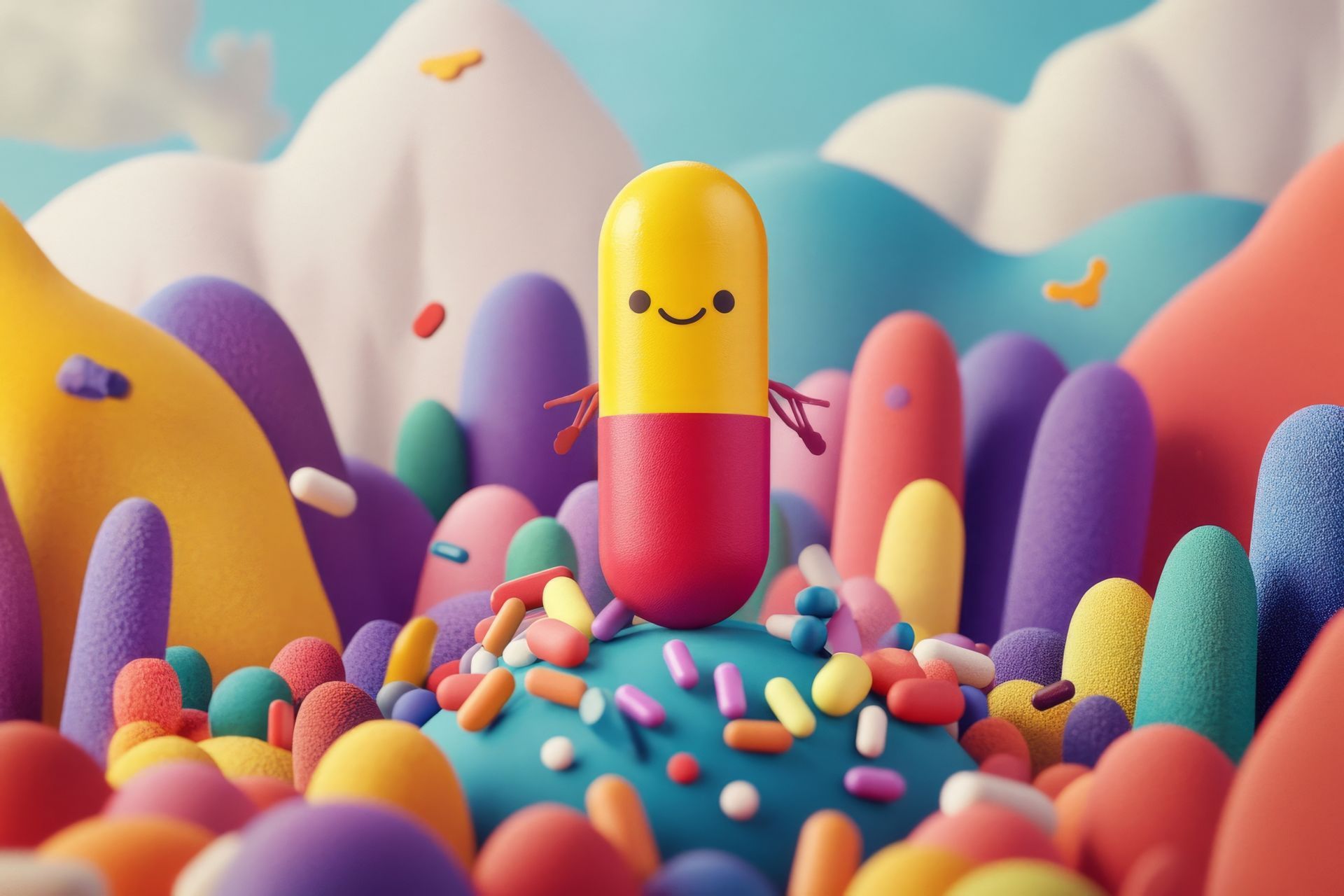MEDICATION Facts & FAQs
To Treat or Not To Treat (with Medication)?

Genetics of MH Conditions
As with most things, genetics plays a major role in a large majority of mental health conditions.
For a child with at least one parent with ADHD, they have an 80% chance of also having ADHD (about the same genetic influence as a parent's height contributes to the height of their child!).
Depression is also highly dependent on family history, especially parents, siblings, or grandparents. This strong genetic influence might account for its high recurrence rate after a medications have been discontinued after a period of remission was achieved.
Anxiety (all forms), like depression and ADHD, also has a strong genetic component.
Bipolar Disorder (BPD) is an example of a disorder that has such a strong genetic influence, that almost 100% of those with BPD have an immediate family member with the same.--A child or teen with just one parent who has Bipolar Disorder has about an 5-8% risk of developing it themselves, but they are at a much higher risk of having any other type of mental health condition(s). On the other hand, a child/teen without a parental history of Bipolar has almost a Zero % chance of developing it themselves!!
Of course, while just the presence of some genes causes that person to automatically develop the symptoms of a particular disorder, the majority of mental health and general medical conditions involve a complex, and often not well understood, interaction between these genes and outside influences or triggers. It is known that traumatic experiences occurring from early childhood through the teenage years, socioeconomic stressors (ie poverty, food insecurity, etc), and community stressors (ie racial discrimination, inequality, etc) can all cause permanent changes within the brain that can provide the "final straw" to start manifesting the symptoms of a particular mental health condition.
Some diagnoses are not only genetically influenced, but they frequently tend to cluster together with some other conditions. The best example of this is the high frequency in which anxiety, ADHD, and Autism Spectrum Disorder (ASD) are diagnosed in the same person. And like these other conditions, research has also linked the great majority (?80%) of ASD to various genes, with more being discovered all the time!
The decision to treat your child/teen's mental health condition with medication can sometimes be a difficult one. Sometimes parents (and older kids) are afraid of medication because of terrible experiences that they have had themselves or heard about from others who had tried medication. Usually the medication "did not work", or there were "horrible side effects". While no medication is without the possibility of side effects, it is important to understand that most medications are not solely targeting a single area in the brain, but rather there may be many other target sites (receptors) in other parts of the body. The best example of this is the category of Selective Serotonin Reuptake Inhibitors (SSRIs), which include medications such as Prozac, Zoloft, and many more. The brain is the primary target with its large number of serotonin receptors, but the GI tract has a lot of serotonin receptors also, and the medication cannot distinguish which receptor it wants to attach itself to. This is why the most common side effects of these medications are nausea, vomiting, abdominal pain, and occasionally diarrhea. However, the good news about these side effects is that they are temporary, and usually resolve completely within a few weeks after the medication is first started or the dose is no longer being adjusted.
The other reason that parents and kids are sometimes hesitant about medication is either a personal history of previous medications "not working" or hearing this from others who have taken it (or another medication for the same condition). In my experience, a lot of times this is not due to the fact that the medication itself is not working, but that its dose is too low to work! Every medication has a "Starting Dose" which in most cases is a low dose to allow the body to gradually adjust to that medication. However, most medications also have a "Minimum Effective Dose," which is the lowest dose of the medication that is expected to produce noticeable improvements in symptoms. The starting dose and the minimum effective dose are often very different! A good example of this is Sertraline (Zoloft). The starting dose varies by age, but in older teens, it is usually 25-50mg. However, for severe anxiety, the actual effective dose is usually 125mg to 200mg! So for the teen who is still taking a starting dose of 25mg for panic attacks, it is no wonder that their symptoms will never improve! In general, for much younger patients, the starting dose of a medication may be the same or just one titration step below the effective dose. These medications are not specifically based on age or weight, so there are some medications where the child may even take the same dose, or a higher dose, than his/her parent!!
So, you might wonder why some providers prescribe only the starting dose of a medication for weeks or months without adjusting it? One huge reason for this is probably due to our (us "older physicians") minimal training about mental health medications back in medical school or residency, or it may be due to an unrealistic fear of particular medications (because doctors may also hear colleagues talk about their patient who had "horrible side effects" from the same medication). They may even have a combination of both of these reasons. This is not a criticism of any medical provider, because if we as physicians/medical providers do not excel in our confidence in the treatment of a particular condition(s), we naturally become overly cautious about that treatment (and usually refer that patient to a specialist). Since I have been fortunate to have had some additional training in pediatric mental health conditions and all of the various medications used to treat them, my own confidence has soared, no doubt due in great part to the strong passion that I developed for this particular focus of pediatric healthcare. My main goal with treatment is to prevent any child/teen or their parents from feeling that the medication that I prescribe does not work--by regularly increasing (titrating) the dose so that it gets to within the effective range as quickly and safely as possible, while minimizing side effects (which are, as mentioned, usually temporary for most medications). Please bring your questions and concerns so that we can discuss them, and I can address them and hopefully allay your fears.
If my child/teen starts medication, will they have to be on it for the rest of their lives?
The answer to this question is...It Depends!
For some conditions, such as ADHD, older teens and young adults tend to grow out of most, if not all, of the impulsivity and hyperactivity, whereas the inattention tends to persist. For a young adult who chooses to become an accountant or other job requiring a lot of focus, they may find that they really need the stimulant medication to function at their job, while someone whose job is less structured may not need any medication at all. However, ADHD is much more than just difficulty concentrating!! It also includes some very disruptive symptoms that will likely persist, especially if it has been undertreated or untreated by medication and therapy (to learn skills such as self-regulation, etc). The major symptom that occurs very often in most kids and teens (and adults, too!) is Irritability! This can vary from mild snippy comments to rage and physical violence. (For more information, check out the ADHD and Aggression Page by Clicking the Happy Capsule with Sprinkles Image Above!)
Other disorders, however, such as depression or anxiety, are usually treated for about 12 months after the child/teen is in "remission" from their symptoms. At this time, if the parents, child/teen, and provider agree, the provider can start a very slow tapering in dose, while monitoring for any recurrence of symptoms.
**One very important thing to consider about the treatment of most diagnoses, especially anxiety and depression, is that numerous studies have shown that the combination of "Therapy" (CBT, or play therapy for younger children) together with medication produces the best outcomes for achieving long-term remission!
For instance, a teen with severe anxiety starts medication at an effective dose to control these symptoms, while they are also in therapy to learn techniques and strategies to be able to manage some occasional "small blips" of anxiety that may still occur. As they continue practicing these techniques, and gain more confidence, they will work with the therapist to gradually be able to manage increasingly greater "blips" of anxiety. Once the older child or teen has been in remission from the majority of their symptoms, they may be able to successfully discontinue their medication, and learn that they are able to managing any anxiety by using the techniques that they learned, and mastered, in therapy. If they do need to resume medication, often they require a lower dose to manage any residual anxiety.
While the child/teen with depression may also be able to successfully discontinue their medication after a stable period of symptom-remission, unfortunately the pattern of depression leads to a very high recurrence rate, especially within the first 8 months after discontinuing medication, and with the majority of patients experiencing a return of severe symptoms by young adulthood.




